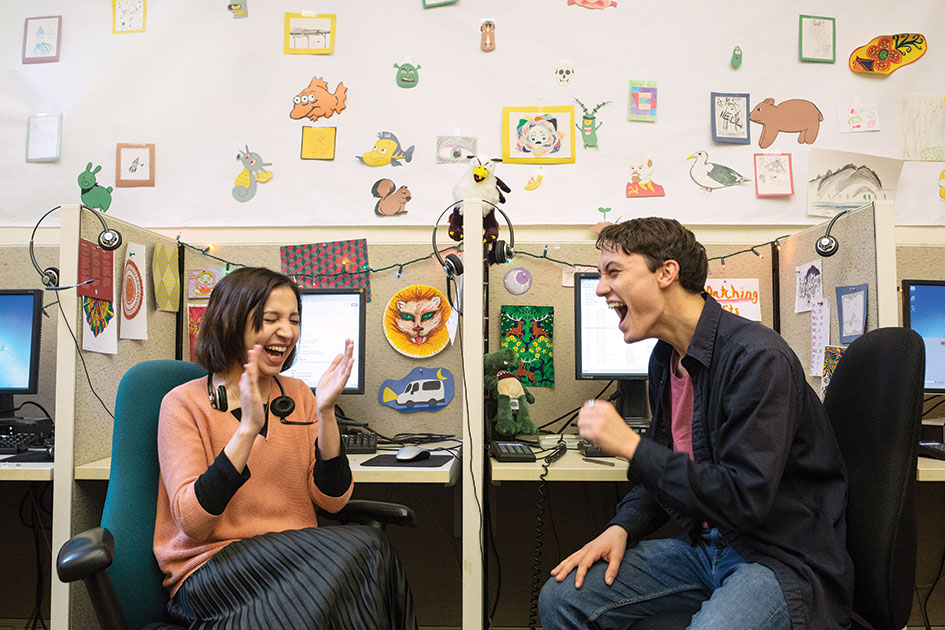Answering the Call
Phonathon connects a new generation of students and alumni.
You’ve just put away the dinner dishes and are getting ready to unwind with a glass of wine, maybe catch the latest episode of Game of Thrones, when the phone rings.
“Hello!” says a chipper voice on the line. “I’m a student at Reed calling on behalf of the Annual Fund . . .”
The possibilities are myriad—swapping stories about the steam tunnels and owl fights in the Quad, what classes they’re taking, your first job after Reed, Occam’s razor, the Pareto principle. Who knows? That serendipitous conversation may wind up being the best part of your day.
And if the connection is genuine, you might even donate to the Annual Fund.
The gift you make winds up going into everything that makes Reed, well, Reed. The Annual Fund’s impact is pervasive and profound, supporting an array of worthy endeavors—financial aid for needy students, faculty research, library books, computers, lab equipment . . . there is not a single student or professor who doesn’t benefit directly.
Located in the basement of Eliot Hall, the phonathon is staffed by 32 Reed students who have been put through a rigorous hiring and training process. On the wall is a poster with the four values the students chose as attributes of a phonathon caller: Professional. Personable. Persuasive. Persistent.
The operation is overseen by Alex Cherin ’12, assistant director of the Annual Fund and himself a phonathon caller in his student days. After working in advertising after graduating, he jumped at the chance to work with and mentor current students and play a role in “shaping a positive part of their experience at Reed.”
Phonathon students are encouraged to see the job as more than a work-study gig. A certain degree of salesmanship is essential, to be sure, but the work is ultimately driven by Reed’s mission.
“At first the job can seem stressful and scary,” says Joel Staudinger ’19, who started out as a caller and worked up to shift manager. “Over time I was able to see that this work was about something bigger, that it was about this grand idea about what Reed is and what it can be. That’s what makes it fulfilling.”
On a recent afternoon, the phonathon was buzzing with a diverse range of voices—first-years and seniors, humanities and science majors, extroverts and introverts. The lights are dimmed but the room is illuminated by the sparkle of Christmas-tree lights.
Alex kicked off the shift with a silent meditation, followed by a quick group check-in and a whimsical question to loosen everyone up (a recent example: “Beyoncé or Rihanna?”) Then he wrote the day’s goal on a whiteboard: $16,857.
“Who thinks we’ll make that tonight?” Across the room hands shoot up. “Yeah!”
The most enthusiastic voice belongs to Lara Simonetti ’20. Last year she inspired more than 200 donors to give back to Reed—an astonishing number.
What’s her secret?
“I just enjoy the conversations,” she says. “I see it as getting to talk to interesting people from many walks of life and connecting over the amazing place that is Reed.”
A history major with an outgoing personality, she takes pride in her job, especially given the fact that she could not have come to Reed without the help of the Annual Fund. A native of Corrientes, Argentina, she dreamed of attending college in the United States but her family couldn’t afford to pay. Most American colleges and universities don’t award financial aid to international students, but thanks to the generosity of donors to the Annual Fund, Reed is among the few that do.
Working for the phonathon allows her the opportunity to give back to the college and also share her own story with donors. “It helps to be able to talk about your own experiences,” she says. “It gives them a chance to see that by giving, they help provide students a great education and a great environment.”
Alex credits her success to an engaging personality and exceptional work ethic. “Lara cares immensely and is always extremely prepared,” he says. “She is a great ambassador for Reed.”
Asking for money can be challenging, but Alex has worked to enhance the professionalism of the operation, while also making the job more fun. Students have decorated the space with art—cardboard leaves dangle from the ceiling, a paper dragon breathes fire from one wall. Posters feature the strangest excuses they’ve gotten for ending a call (e.g., “My wife’s giving birth!”) and the most offbeat email usernames they’ve heard (hamsterwrangler, veganchili).
The vibe belies the importance of the phonathon, as well as its complexity.
On any given shift, callers attempt thousands of calls, though only a fraction lead to actual interactions. Last year the phonathon generated nearly $352,086 from roughly 1,800 donors, a crucial chunk of the $4.9 million raised by the Annual Fund. This year the goal is $400,000 and 2,200 donors. They’re off to a promising start—in September alone, the phonathon raised $153,000.
While Alex provides tips on making “the ask” or handling rejection, the operation is as much about heart as it is science. More than anything, he says, he wants the students to make genuine connections with the people they call—a dynamic that results in a win-win for everyone, regardless of the outcome. Although, of course, he would prefer that the phone conversations end with a generous donation, too.
“It’s not just about money,” he says. “It’s really about engaging with someone else who loves Reed. Ultimately you want to have a conversation that makes the case for why it’s important to give back.”
So when you hear the phone ring, take a moment to answer the call—you may be surprised to find a kindred spirit on the line.
Tags: Alumni, Giving Back to Reed, Institutional, Students
